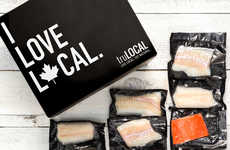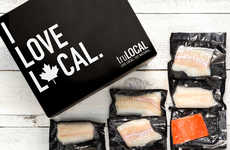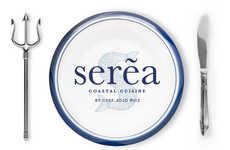



Direct-to-consumer seafood services offer consumers a greater sense of control
Trend - In an effort to offers heightened convenience, an increasing number of vendors are providing seafood subscription services. This gives consumers the perception that they have greater visibility on where their seafood is sourced by offering them a curated selection of products that can be purchased directly from the provider.
Insight - Eco-conscious consumers are aware of the toll many industries can take on the environment. As terms such as 'Urban Footprint' become more commonplace, environmentally aware consumers become more conscientious of the many resources larger brands require to function. Thus, they actively seek out smaller, more ethically-focused companies that align with their environmental beliefs.
Insight - Eco-conscious consumers are aware of the toll many industries can take on the environment. As terms such as 'Urban Footprint' become more commonplace, environmentally aware consumers become more conscientious of the many resources larger brands require to function. Thus, they actively seek out smaller, more ethically-focused companies that align with their environmental beliefs.
Workshop Question - What is your brand doing to deliver a greater sense of control to your customers?
Trend Themes
1. Direct-to-consumer Seafood Subscriptions - Direct-to-consumer seafood subscription services offer consumers greater control over their seafood choices, promoting sustainable and ethical fishing practices.
2. Sustainable and Ethical Seafood Sourcing - Eco-conscious consumer demand for sustainably and ethically sourced seafood has created opportunities for small, independent fishing companies with transparent and locally sourced supply chains.
3. Subscription-based Meat Delivery Services - Meat delivery subscription services are popularizing small-farmed meats, promoting organic and antibiotic-free products from independent farms.
Industry Implications
1. Seafood Industry - Seafood vendors and fishermen can disrupt traditional seafood distribution channels by moving towards direct-to-consumer subscription services and promoting sustainable and ethical fishing practices.
2. Fishing Industry - Small, independent fishing companies can align with eco-conscious consumer demands for sustainably and ethically sourced seafood by adopting transparent and locally sourced supply chains and direct-to-consumer subscription services.
3. Meat Industry - Meat delivery subscription services can promote small-farmed meats and independent farms by offering customizable and sustainable options for consumers.
5 Featured, 29 Examples:
34,722 Total Clicks
Date Range:
Jan 18 — Dec 19
Trending:
Average
Consumer Insight Topics:

































